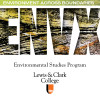main content Act Local, Think Local

I finished the ENVS program in the Spring of 2020, at the onset of the pandemic. Although there were many collective uncertainties at the time, I am grateful to have been able to transition from being an intern to a full time position at a local environmental economics think tank. It was during this experience I was exposed to the climate and environmental-focused work in Portland and saw a future where I could put my ENVS skills to work. At the start of 2021, I transitioned to a different organization, working on issues around the Portland Harbor Superfund site. This opportunity helped my understanding of the reality of environmental challenges grow and how policies, contamination, and local governments affect communities at the individual level and how complex environmental cleanups unfold.
In my current professional role, I work at the intersection of environmental justice and climate issues, interfacing with local, state, federal and Tribal governments and agencies. This has helped me understand the mechanisms and institutions of governance that influence and drive environmental change in the context of Portland, Oregon. I have come to appreciate the role and nature of rivers as entities that connect people and places over vast distances in time and space. I have learned about the Chinook and other tribes who have inhabited these lands since time immemorial, the Chinese migrant workers who once farmed and inhabited the same area, and the communities of African Americans who once called this place home. I have also learned about governmental policies that have led to the displacement and expulsion of these and other communities to make way for industry - whose activities have led to the contamination of the Willamette River.
My academic experiences in the ENVS program introduced me to the importance of interdisciplinary thinking and understanding when approaching environmental challenges. This has given me a solid framework to approach my work and understand the different environmental challenges communities in Portland face. Taking courses that explored the intersection of the environment and sociology, global history, economics, sustainability, entrepreneurship, chemistry, and biology introduced me to frameworks, theories, and methodologies within each of these disciplines which have shaped my understanding of environmental challenges and their solutions. Because of these classes, I am able to understand technical reports related to the harbor cleanup, ask questions to clarify, and assess and navigate the power dynamics that exist between agencies, governments, and communities.
As I look to a future where the reality of climate change is assured, I have come to understand the importance of climate-resilience and community-based frameworks that affect policies and solutions. And, more importantly, how restoring the relationship of communities to the lands and waters they inhabit ensures sustainability for future generations. Through the ENVS program, I have gained different perspectives and skills that I hope to build on in the future as I explore graduate programs to further my work and channel my interests by unpacking environmental challenges in South Africa and the Global South - an endeavor I began with my honors thesis.
Mamelang’s student profile can be read here.
Environmental Studies is located in room 104 of Albany Quadrangle on the Undergraduate Campus.
MSC: 62
email envs@lclark.edu
voice 503-768-7790
Symposium Advisor Jim Proctor
Environmental Studies
Lewis & Clark
615 S. Palatine Hill Road
Portland OR 97219
More Stories

Farming, Oceanography, and the Arctic
Rylie Neely ’20 shares how she continued to use her ENVS education during an unplanned career pause due to Covid.
2025 Project Descriptions for the Rogers Program
Summer science research opportunities

Finding Paths
ENVS alum, Julian Brastow ’22, describes his initial job search after graduating from LC.

Place-Based Learning
From Trash to Treasure: Creating Art From Waste
Cara Tomlinson’s Art and Ecology class uses waste materials from around Portland to create beautiful and meaningful works of art. This course offers a fresh approach to creative practice, merging art and ecology to help students respond to the climate crisis, explore the agency of materials, and build connections to place.
